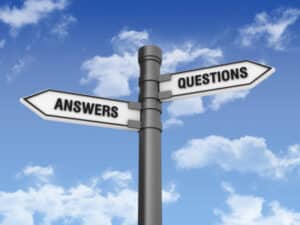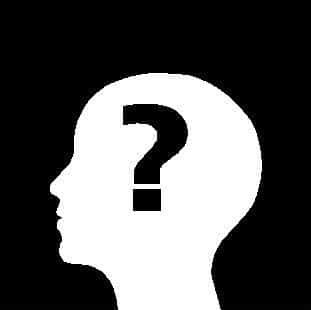Questions in Counselling
Questions in counselling is classed as one of the advanced counselling skills.
Counselling questions may be open-ended, probing, or clarifying.
Leading questions should be avoided as they may introduce an agenda outside of the client's frame of reference.

Types of Counselling Questions
a. Open Questions
Open questions are questions that do not have a "yes" or "no" answer.
The counsellor uses open questions to clarify his or her understanding of what the client is feeling.
Open questions:
- may begin with how, what or who
- require an answer other than 'yes' or 'no'
- may be used to gain information (what happened as a result?); explore thoughts, feelings, attitudes and opinions (what were you hoping to achieve?); or consider hypothetical situations (how might you deal with. ..?)
When thinking about asking a client a question, first ask yourself whether the question is necessary.
A basic rule here is to ask a question only if you feel it will:
- clarify your understanding
- help the speaker to explore their own process
For example:
Tutor: "Tom, when you were in the role of speaker, what did Nafiza do as a listener that helped you share your story?"
Open questions, if used respectfully, will help build a trusting relationship where the speaker feels safe to explore what is going on for them.
One final observation: Be very careful with the 'why' question, as sometimes this can feel very judgmental and might make you sound like a teacher questioning a child.
Try swapping the word 'why' for 'what'. So instead of saying, 'Why did you do that?', ask, 'What made you do that?'
You will be surprised how much better the conversation flows, and how much more you will both find out!
b. Closed Questions
Closed questions are questions that lead to "yes" or "no" answers.
For example:
"Do you feel sad?" No.
"Do you feel happy?" No.

Such interactions could go on forever and feel to the listener like some sort of bizarre parlour game – or, even worse, a police interview.
Hence, closed questions may be unhelpful in terms of the replies given.
Many people also believe they are asking 'open questions' when in fact they are asking complicated 'closed questions'.
Repeated use of 'closed questions' may result in the client saying less and less and the counsellor feeling pressured to ask more and more questions to keep the relationship going.
But closed questions can be used in counselling. However the therapist must recognise when a closed question is appropriate.
For example:
Counsellor: "Welcome. Are you ready for us to start?"
Client: "Yes."
Free Handout Download
Appropriate Questions in Counselling Overview
c. Clarifying Questions
Clarifying questions are open questions used by the counsellor to make sure they fully understand what the client means.
Clarification is used so the counsellor does not misunderstand the client's frame of reference.
When a clarifying question is asked, the client has the opportunity to either correct the counsellor or reinforce that the counsellor does understand.
Being in the client's frame of reference is an important component of empathy which is a requirement in a therapeutic relationship.

Have you ever been in a situation where you have been asked one question after another? It can feel like you are being interrogated, rather than listened to!
Someone who is skilled in the ‘art of listening’ will use open questions sparingly, to help clarify what the client has said so that they can reflect and paraphrase it more accurately.
"If we ask the right question, the client is suddenly going to see this massive mound of opportunity for them to grow. But this is not our journey; it’s the client’s journey. It’s for them to find the mound of opportunity, and it may well not be the same one that we see."
Empathic Questioning
In the term ‘appropriate questioning’, the word ‘appropriate’ is really important.
That’s because so often, questions are inappropriate – and this can derail the empathy within the counselling relationship.
Appropriate questioning, meanwhile, can deepen relational depth with the client.
The use of questions is usually covered quite early in counselling training – I do so with my Level 2 learners (in the introduction to counselling, Counselling Concepts).
Aside from introducing the counselling theory that I cover in this blog post, I warn them that questioning is to be used only when 100% necessary. And very often, questions are not necessary.
Makes sure that you only use questions to clarify your understanding, do not be intrusive, and remember that when a client is answering a question they are not accessing the part of the brain which deals with emotions.
Questioning in Person-Centred Counselling
In the person-centred approach to counselling, we believe that the client is the expert—this is what Carl Rogers told us.
It’s not for us to guide the client; it’s for the client to guide us, and for us to walk with them in their subjective reality. That is the empathic bond that we have with the client.
If we ask a question, it is for our knowledge—for us to better understand what the client is bringing.
We must be really careful that our questions don’t set the agenda, that we are allowing the client to do this, even when (and this can be difficult) we can see that the meat of what the client needs to work on is in a different direction.
We might feel we can see it: it’s there, it’s massive, and the client is so close to it—they just need a tiny nudge and then they’ll see it.
So if we ask the right question, the client is suddenly going to see this massive mound of opportunity for them to grow. But this is not our journey; it’s the client’s journey.
It’s for them to find the mound of opportunity, and it may well not be the same one that we see.
Free Handout Download
Appropriate Questions in Counselling Overview